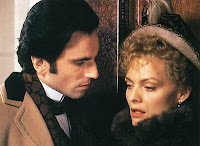Sept. 17, 1993—
The Age of Innocence, an
adaptation of the 1920 Pulitzer Prize-winning novel by Edith Wharton,
opened to general release in New York, on its way to disappointment both at the
box office and at the Academy Awards.
But in the
three decades since, this piercing examination of conscience and conformity versus the promise of freedom and self-fulfillment
has become celebrated as an example of bravura cinema, as well as representing a
high point in the careers of its three principal actors: Daniel Day-Lewis, Michelle
Pfeiffer, and Winona Ryder.
The 30th anniversary of this plush period
drama coincides with the release this fall of Killers of the Flower Moon,
the latest entry in the half-century career of Innocence director Martin Scorsese, as well as Season 2 of The Gilded Age, the HBO series that
occurs in the “Old New York” milieu that Wharton chronicled with such irony and
insight.
All of this provides an opportunity to examine how The
Age of Innocence relates to and departs from Scorsese’s larger work; why
its initial reception fell short of expectations; and why it nevertheless
repays repeated viewings.
Underappreciated at the time
Coming off the acclaimed Goodfellas, Scorsese had
now turned to the costume drama genre that had long interested him. Friend Jay
Cocks had been urging Scorsese to see this as next project for nearly a decade,
but it was only after the controversy over the alleged “blasphemy” of The
Last Temptation of Christ had died down that the director decided to collaborate
with Cocks on the script.
But the choice puzzled and mystified fans that were
awaiting another in his line of urban dramas often laced with violence and
profanity, dating back to Mean Streets and Taxi Driver in the
Seventies. (They would have to wait another two years to get what they wanted: Casino.)
The reception might have been different if, as
planned, the movie had debuted in the fall of 1992, when its principal
competition at the Academy Awards would have been Clint Eastwood’s Unforgiven.
But it was held back by over a year to allow Scorsese
more time to edit, so that what would have been prestige Oscar bait would now
enter awards season facing Steven Spielberg’s Holocaust drama Schindler’s
List.
In an interview for a Criterion Collection DVD from2018, Scorsese said that Vincent Canby’s negative review in The New York
Times “killed” The Age of Innocence. That is probably overstating
matters.
Variety reviewer Todd
McCarthy was closer to the mark in predicting, “For sophisticated viewers with
a taste for literary adaptations and visits to the past, there is a great deal
here to savor…But it is difficult to picture general audiences warming up to
these representatives of the old ruling class.”
Even the opening scene brings audiences face to face
with this situation: a sequence from Gounod’s opera Faust that segues
into a sweeping reaction shot of the audience.
It sets up that the upper-crust spectators are less
interested in the onstage spectacle than the drama in the seats: the presence
of Countess Ellen Olenska, a scandal-shadowed member of the socially prominent
Mingott family. It also foreshadows the doomed relationship that will
eventually develop between Ellen and lawyer Newland Archer.
Yet casual viewers, unfamiliar with the Faust source
material, are unlikely to grasp the symbolism. Moreover, as the scene lingers
for a couple of minutes without subtitles, it tests viewer attention and
patience from the start.
Moreover, Wharton’s characters speak in code—approaching
sensitive subjects but using silences and facial expressions fill in the gaps
left by words they dare not utter.
The similarities between Gilded Age aristocrats
and Mafia gangsters
Viewers taking in this atmosphere of physical opulence
and verbal repression, then, are likely to be astonished by Scorsese’s claim
that this was “the most violent film I ever made.” What could he possibly mean
by this?
The best answer might come in one of the film’s
best-remembered set pieces: a dinner at which Archer, moving toward breaking
away from his affectionate but passionless marriage to the judgmental,
unimaginative conformist May, finds his path blocked by the entire mass of
aristocratic New York.
Like Goodfellas’ Tommy DeVito finding too late
that his initiation as a Mafia “made man” will not in fact transpire, Archer
discovers a cadre that will punish him for defying its code, with the camera
sweeping past the guests and their sumptuous even as narrator Joanne Woodward
intones Wharton’s words:
Archer, who seemed to be assisting at the
scene in a state of odd imponderability, as if he floated somewhere between
chandelier and ceiling, wondered at nothing so much as his own share in the
proceedings. As his glance travelled from one placid well-fed face to another
he saw all the harmless-looking people engaged upon May's canvas-backs as a
band of dumb conspirators, and himself and the pale woman on his right as the
centre of their conspiracy. And then it came over him, in a vast flash made up
of many broken gleams, that to all of them he and Madame Olenska were lovers,
lovers in the extreme sense peculiar to "foreign" vocabularies. He
guessed himself to have been, for months, the centre of countless silently
observing eyes and patiently listening ears, he understood that, by means as
yet unknown to him, the separation between himself and the partner of his guilt
had been achieved, and that now the whole tribe had rallied about his wife on
the tacit assumption that nobody knew anything, or had ever imagined anything,
and that the occasion of the entertainment was simply May Archer's natural
desire to take an affectionate leave of her friend and cousin.
The images, in combination with the foregoing
description, eliminate the need to include onscreen this Wharton passage that may
have capped the resemblance between the genteel aristocrats and the crude
gangsters of Goodfellas:
It was the old New York way of taking life
"without effusion of blood": the way of people who dreaded scandal
more than disease, who placed decency above courage, and who considered that
nothing was more ill-bred than "scenes," except the behaviour of
those who gave rise to them.
A cinematic feast
This dinner scene is an example of how Scorsese sought
visual and aural counterparts to Wharton’s verbal splendor. The aural component
was supplied by Woodward’s voiceover narration and a memorable, Brahms-influenced
soundtrack by Elmer Bernstein, while the visuals came through Gabriella
Pescucci’s Oscar-winning costume design and Dante Ferretti’s production design.
In focusing on the themes of money and marriage in
Victorian Age, Scorsese had one obvious antecedent: William Wyler’s The
Heiress. In a February 1994 interview with Ian Christie of Sight and
Sound Magazine, Scorsese acknowledged that the 1949 adaptation of the
Broadway play of the same name and its source material, Henry James’ Washington
Square, “made a strong impression on me as a child.”
Yet, though he admitted that it still “holds up well,”
he criticized it for being “theatrical,” with a “three-act” structure—and “no
narration, no montages, no flashbacks or flashes forward and no visual
interpolations such as letters”—all devices he employed in The Age of
Innocence.
These were not the only methods that helped make this
one of Scorsese’s most controlled movies: Vibrant colors, dissolves,
transitions, and similar visual motifs echo and reinforce each other, or subtly
reinforce characterizations:
*Fireplace scenes building slowly in intensity parallel
the growing emotional intimacy of Archer and Ellen;
*Archer bangs a pen violently at one point to force
the ink out—encapsulating his frustration with bottled-up social norms;
*Demure young May is dressed early on in virginal
white, while her more unconventional, passionate older cousin Ellen is dressed
in red;
*And one scene that Scorsese made sure to carry over
from the book depicted May as skilled at archery—a sly representation of how
she will hit her target, Archer himself.
Unlike The Gilded Age, which in its first
season leaned heavily on New York stage actors, Scorsese relied heavily on
British actors.
Scorsese and Cocks have explained that such casting
made sense, as New York aristocrats of the Victorian Era still retained strong verbal
influences from their English ancestors. I think the choice also might derive
from a belief that British actors came with appreciation for texts and a verbal
dexterity springing from their intensive stage training.
Even so, to be fair, it’s hard to argue with what Lewis,
Richard E. Grant, Alec McCowen, Michael Gough, Geraldine Chaplin, Stuart
Wilson, Siân Phillips, and Miriam Margolyes did with their dialogue.
I think that The Age of Innocence is one of
Scorsese’s overlooked masterpieces. Far more than most movies, it yields new
insights each time viewed to go with scenes that will never fade from the memory.
Only the third time around, for instance, did I notice
that a portrait of a woman bearing a striking resemblance to Woodward hangs on
the wall in one scene. And only on this latest viewing did I pick up on how the
camera, having focused for several minutes on the dogs climbing over Miriam
Margolyes as Mrs. Mingott, mocks her further by moving towards other objects in
the room: paintings, drawings, and sculptures featuring even more dogs.
At the same time, fans like me recall how Archer’s
unbuttoning of Ellen’s glove in a horsedrawn carriage leads to a passionate
encounter, or how the nimbus of light in which he beholds Ellen from a distance
as he waits for a sailboat to pass a lighthouse at sunset.
Enhancing appreciation of Wharton
I am also grateful that Scorsese’s adaptation has
fostered renewed appreciation of Wharton, one of my favorite writers, after an
extended period of popular neglect.
In the 1920s and 1930s she had enjoyed significant
attention, not only in sales but also in royalties from theatrical and
cinematic adaptations. The Age of Innocence itself became a 1928
Broadway vehicle for Katherine Cornell, as well as a 1924 silent film (now
lost) and a 1934 talkie starring John Boles as Archer, Julia Haydon as May and
the incomparable Irene Dunne as Ellen.
Given the reverence accorded Scorsese and his greater
faithfulness to the source material (approximately an hour longer than the
Dunne version), this adaptation was not only more high-profile than these earlier
efforts, but more successful than Hollywood’s other attempts to explore Wharton
in the 1990s.
The Children
(1990), with Kim Novak and Ben Kingsley, took on one of the novelist’s
bestselling but less critically acclaimed works of the 1920s, and Ethan
Frome (1993) featured Liam Neeson and Patricia Arquette in Wharton’s
tale of thwarted romance in the Berkshires. The decade closed with Gillian
Anderson movingly depicting doomed Gilded Age beauty Lily Bart in The House
of Mirth (2000).
In November, Apple TV+ will begin a series based on Wharton’s
The Buccaneers, a novel completed several decades after her death in
1937 by Marion Mainwaring. Although Sofia Coppola’s attempt to develop another
Wharton novel, The Custom of the Country, has temporarily hit a roadblock,
there is always the hope that this biting satire will also find its audience.
Nevertheless, it would be difficult for any of these past, present,
or future adaptations to match the art, depth of feeling, and appreciation for
the source material shown by Scorsese’s Age of Innocence.


























